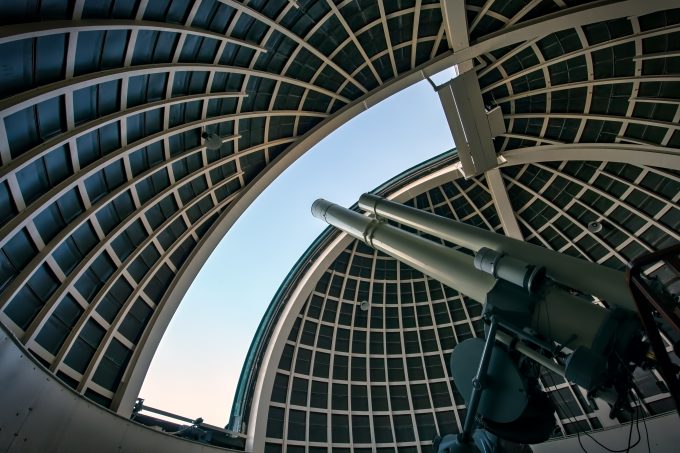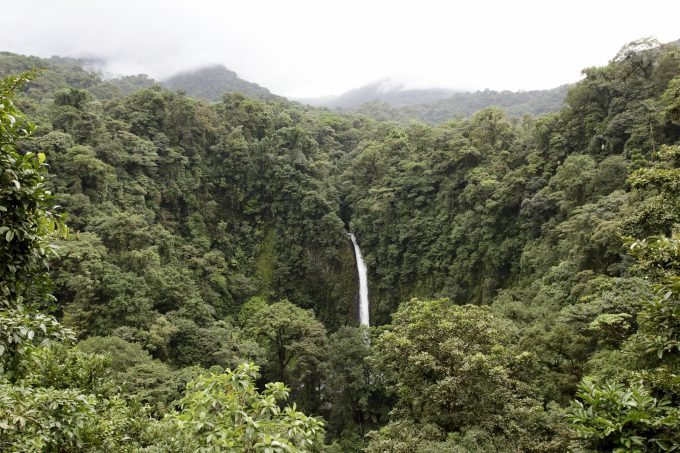
These great popular science books offer accessible science to readers from all levels of knowledge. There's something here for everyone, whether you're interested in environmental science, kitchen chemistry, or just want to try out some fun experiments with your kids over the summer. Check out our picks for the best in popular science, and see how you can use them to better understand and explore our world.
Astronomy, Cosmology, and Space Travel

The universe may operate on top of some incredibly mind-boggling physics, but those new to the subject can still wrap their brains around the basics with the following titles:
- Cosmos: Carl Sagan is one of the most influential astronomers ever to live, and when Cosmos was released it was the bestselling popular science book ever published. Today, it remains a seminal work inspiring everyone from scientists to popular fiction authors.
- Packing for Mars: The Curious Science of Life in the Void: Dubbed "America's funniest science writer" by the Washington Post, Mary Roach explains the day-to-day experiences of life in space thanks to a variety of strange and bizarre space simulators here on Earth in one of the best science books of the genre.
- Astrophysics for People in a Hurry: Written by celebrity astrophysicist and one of the patron saints of popular science, Neil deGrasse Tyson boils down the mysteries of the universe in chunks easy to digest for the interested reader on the go.
- The Edge of Physics: New Scientist consulting editor Anil Ananthaswamy travels the globe in search of people, places, and developments that lead to humanity's greater knowledge of the universe.
- Hidden Figures: The American Dream and the Untold Story of the Black Women Mathematicians Who Helped Win the Space Race: Written by Margot Lee Shetterly and the basis for the recent hit movie, this book explores the contributions of a talented team of "human computers" that were instrumental in America winning the space race.
- A Brief History of Time: Stephen Hawking and Carl Sagan alone could probably fill up this section, so self-discipline limits them to only two appearances on this list. A Brief History of Time is one of the former's most read books, and for good reason.
- Big Bang: The Origin of the Universe: For those who may find A Brief History of Time a little heavy on the physics, Simon Singh's book is more-people driven. His step-by-step explanation of the process of the evolution of the Big Bang Theory is a must-read.
- The Planets: With lush prose, Dava Sobel finds creative ways to merge science with pop culture and ancient perspectives as a means of conveying some truly intriguing stories about Solar System planets.
- Brother Astronomer: Adventures of a Vatican Scientist: Science and religion publicly share an antagonistic relationship, but Jesuit Brother Guy Consolmagno, an astronomer with the Vatican, points out that there is really no reason they cannot peacefully coexist.
- Mapping the Heavens: The Radical Scientific Ideas That Reveal the Cosmos: Priyamvada Natarajan takes readers on a "greatest hits" tour of the discoveries that most-shaped our understanding of the cosmos, illustrating how earth-shattering ideas become the orthodoxy of science.
- The Right Stuff: Beloved of almost anyone who pines to learn more about space travel, Tom Wolfe's The Right Stuff captures the imagination of anyone who has ever wanted to surge beyond the boundaries of this planet.
- Turn Left at Orion: This highly-recommended stargazing guide by Guy Consolmagno and Dan M. Davis ends up on quite a few reading lists, and for good reason! Approachable and informative, it serves as an excellent introduction to astronomy.
- The Backyard Astronomer's Guide: Beginner astronomers yearning to take to the skies with telescopes and guidebooks in-hand would probably find this well-received resource extremely valuable.
- 365 Starry Nights: Another book highly recommended for backyard and beginner astronomers, Chet Raymo's fantastic resource contains 365 essays on the ever-shifting night sky.
- Black Holes and Time Warps: Einstein's Outrageous Legacy: Featuring a foreword from Stephen Hawking, Kip S. Thorne's book highlights the weird and wonderful theory of general relativity and its undeniable impact on the industry.
- The Alchemy of the Heavens: Mostly emphasizing the Milky Way, Ken Croswell blends astronomy and chemistry together to discuss the composition of stars, planets, and other celestial bodies, using language most readers can understand.
- The Day We Found the Universe: Marcia Bartusiak guides readers on the incredible history following Edwin Hubble's 1925 discovery that the universe was far larger than anyone had ever hypothesized. She explores everything from the amazing technology to the colorful characters that opened our eyes to the cosmos in a way from which there was no going back.
- The Black Hole War: Complicated astrophysics concepts get broken down into easy, but not condescending, explanations suitable for beginners by Leonard Susskind.
- Breaking the Chains of Gravity: The Story of Spaceflight before NASA: You might think that the history of American spaceflight begins with NASA, but nothing can be further from the truth. Amy Shira Teitel takes us on a journey through the prehistory of the future.
- Exoplanets and Alien Solar Systems: Planets without suns and other mysterious celestial bodies are explored in this title by Tahir Yaqoob.
Biology and Natural History

An understanding of biology means an understanding of how humans function and interact with the other organisms around them. Here are some of the best science books on the subject:
- The Immortal Life of Henrietta Lacks: Now a major motion picture, Rebecca Skloot follows the path of the cells of a poor tobacco farmer taken without her knowledge or consent as they help revolutionize medicine, leading to the polio vaccine, gene mapping, and other great discoveries. It's one of the most important books to read, period.
- The Epigenetics Revolution: How Modern Biology Is Rewriting Our Understanding of Genetics, Disease, and Inheritance: Nessa Carey is a leading epigenetics researcher seeking to change the way we think about how life on Earth has evolved its various behaviors. Her book covers everything from how ants control their colonies to how epigenetics might cure famine in the future.
- The Drunken Botanist: Throughout human history we have utilized plants to create a wide variety of alcohols for consumption. Amy Stewart explains how sake was born of rice, how corn beget bourbon, and many other tipsy bits of trivia.
- The Sixth Extinction: An Unnatural History: There have been five major extinction events that we know of in Earth's history. Elizabeth Kolbert examines the possibility that mankind's legacy might be the next one.
- The Woman with a Worm in Her Head: And Other True Stories of Infectious Disease: Fascinating – though obviously not for the squeamish. Pamela Nagami has a cornucopia of bizarre tales regarding the many unique ways nature can try to kill you.
- Silent Spring: First published in serial form in the New Yorker in the 1960s, Rachel Carson's passionate defense of the planet and the damage man does to it launched the environmental movement and led to many landmark policies designed to protect the land we live on.
- The Origin of the Species: Readers willing to maneuver Darwin's dry Victorian prose will be met with some of the most influential and controversial scientific writings ever published. A must-read for anyone hoping to study biology in any depth.
- Silent World: The late, great Jacques Cousteau tantalized the imaginations of children and adults alike as he explored the world's oceans and the delicate interplay between the animals, plants, and their big blue environment.
- Wonderful Life: In this classic work of natural history, Stephen Jay Gould takes readers on a journey to the Burgess Shale for a valuable lesson on some of the oldest fossils in the world.
- Birds of America: When John James Audubon first made his legendary avian paintings available to the masses, he never realized that centuries later people would still praise his talent and ability to make biology an accessible science.
- Krakatoa: The Day the World Exploded: Another excellent book by Simon Winchester about one of the world's most famous volcanic explosions for general audiences fascinated by how the planet works.
- Isaac's Storm: In 1900, one of the deadliest hurricanes in history struck Galveston, Texas. Erik Larson's work of creative nonfiction obtained widespread attention and accolades for bringing history and earth science to a broad audience.
- How to Cool the Planet: This Geoengineering book takes a look at what might happen if, in a climate emergency, we had to suddenly cool the planet in a hurry.
- In the Shadow of Man: World-renowned primatologist, conservationist, and humanitarian Jane Goodall's account of her life studying the chimpanzees of Gombe is one of the seminal texts in ape history, and also the story of a very extraordinary woman.
- Born Free: A Lioness of Two Worlds: The basis of the renowned British drama, Joy Adamson tells of how she helped a lion cub raised in captivity return to the wilds of Africa as she and other scientists try to rebuild wild populations.
- The Death and Life of the Great Lakes: Few bodies of water have the significance to American history and culture like the Great Lakes, but Dan Egan's books shows how they are under ecological threat from a variety of sources, and how easily we could lose these beloved habitats.
- Sex in the Sea: Our Intimate Connection with Sex-Changing Fish, Romantic Lobsters, Kinky Squid, and Other Salty Erotica of the Deep: Animal reproduction comes in a myriad of forms. Marah J. Hardt gleefully illustrates that wide variety through the strange and amazing ways the denizens of the deep ensure the continuation of their species.
- Life on the Edge: The Coming of Age of Quantum Biology: The possibilities of what cutting edge quantum science can do with biology are almost too mind blowing to contemplate, but contemplating them is the wonderful job of Johnjoe McFadden and Jim Al-Khalili. This book will show you some of the amazing ways we may be using biology in the future.
- Cannibalism: A Perfectly Natural History: Cannibalism is one of humanity's great cultural taboos, but Bill Schutt explains its unique role in evolution.
- Natural History: A Selection: Finally, one of the most important texts from the ancient world. Pliny the Elder's work is a way to see exactly how people in the first century AD viewed and explained their natural world. It's a great way to see how far science has come.
Physics

Considering the advanced mathematics involved in physics, it comes as no surprise that general audiences find it one of the most intimidating sciences. Fortunately, these books exist to slice away at some of the mystery:
- Hyperspace: Even individuals with a tenuous grasp of physics still understand and appreciate the theories behind multiple and parallel universes, and this book by Michio Kaku explains how the concepts work in clear enough language.
- The Age of Entanglement: Louisa Gilder writes of the personalities and experimentalists that shaped quantum physics as it is understood and practiced today.
- Basic Physics: Anyone driven to teach themselves the basics of physics can appreciate this textbook by Karl F. Kuhn's goals and exercises.
- The Dancing Wu Li Masters: This beautiful book draws parallels between dance, mysticism, culture and of course physics, presenting audiences with a provocative, philosophical read without any complex mathematics.
- Magic Furnace: Marcus Choun explores the interstellar origin of atoms, and how we are all made of star stuff.
- Only the Longest Threads: This is a book that does for the history of physics what Sophie's World did for the history of philosophy. Tasneem Zehra Husain uses fictional stories to explain the great moments in the evolution of physics in science in a way that is compelling and engaging.
- The Trouble With Physics: The Rise of String Theory, the Fall of a Science, and What Comes Next: Lee Smolin charts how string theory rose in prominence, but then fell as it became untestable, finally looking ahead to what the next great chapter of physics might be.
- 101 Quantum Questions: What You Need to Know About the World You Can't See: Quantum physics involves a world two small for us to see and, for many of us, too big to understand. Author Kenneth W. Ford and illustrator Paul Hewitt break down this fascinating branch of physics in a way that is easy and fun to learn about.
- The Woman Who Knew Too Much: Alice Stewart and the Secrets of Radiation: In the 1950s Alice Stewart began her research into the harmful effects of radiation, challenging much of the scientific consensus and making her many enemies. Gayle Greene chronicles her life and controversial fights to protect people.
- Most Wanted Particle: The Inside Story of the Hunt for the Higgs, the Heart of the Future of Physics: The Higgs boson is the Holy Grail of particle physics, partially because no one has been able to find it yet. Jon Butterworth explains that scientists at CERN are diligently looking for the missing link to explaining our universe.
- Martians of Science: Five Physicists Who Changed the Twentieth Century: Istvan Hargittai reveals the lives of five physicists from Budapest who came to America and changed the world forever, spawning everything from the hydrogen bomb to the Jet Propulsion Laboratory in the process. It's an amazing tell of giants in science.
- Relativity: While not exactly the easiest read for non-physicists, without Albert Einstein's findings the modern world as understood today simply would not exist. This is widely regarded as one of the best science books in the genre.
- Six Easy Pieces: This compilation of six lectures by Nobel Prize winner Richard Feynman breaks complex physics concepts down into language that almost anyone can understand.
- The Cosmic Landscape: Perhaps a little more advanced than some of the other books on this list, The Cosmic Landscape by Leonard Susskind delves into string theory and its role in all corners of the universe.
- The Elegant Universe: Superstring theory, general relativity, and quantum mechanics converge into one resource that brings some of these basic physics findings to general audiences.
- E=mc2: A Biography of the World's Most Famous Equation: Einstein's iconic equation on the relationship between mass and energy boasts an incredible story and history, recounted here by David Bodanis. The writer certainly does not skimp on exploring how this earth-shattering finding interacted with the work of other physicists as well.
- The Five Ages of the Universe: Read about the history of the universe starting with the Big Bang and twisting and turning through until forever.
- Edge of the Universe: Explore the cosmic horizon and beyond in this book that is accessible for experts and amateurs alike.
- The Theoretical Minimum: Learn about Physics 101 with a DIY twist in The Theoretical Minimum, a book that can help you make up for not delving deeper into physics while you were in school.
- Chaos: Making a New Science: Chaos theory is one of the most significant scientific waves of our time. James Gleick brings readers not only the technical aspects of this new discipline, but the colorful and dynamic people who came together to further it.
Psychology and Sociology

The social sciences impact humanity just as much as the "harder" ones out there, making them essential subjects for wider comprehension of how the world works.
- High Price: A Neuroscientist's Journey of Self-Discovery That Challenges Everything You Know About Drugs and Society: Carl Hart grew up in one of Miami's toughest neighborhoods, and in doing so became keenly interested in how drugs affect the brain. This book shows him using neuroscience to change the conversation around addiction.
- Magic Trees of the Mind: How to Nurture Your Child's Intelligence, Creativity, and Healthy Emotions from Birth Through Adolescence: New research shows that the right kind of development in early childhood directly affects the biological growth of neurons in the brain, Marion Diamond and Janet Hopson's "magic tree of the mind." This book prepares parents for taking advantage of that research.
- Post Traumatic Slave Syndrome: America's Legacy of Enduring Injury and Healing: The history of Americans of African descent in this country is one of racial injustice and cruelty. Joy DeGruy looks through the lens of that history to explore how a race's collective trauma shapes their minds.
- Neurotribes: The Legacy of Autism and the Future of Neurodiversity: Autism has gone from terrifying mental condition to an example of the diversity of the human brain. Steve Silberman charts the history of that journey from the first diagnoses to the birth of the concept of neurodiversity.
- White Trash: The 400-Year Untold History of Class in America: Nancy Isenberg turns her sights on the "waste people," "offals," "rubbish," "lazy lubbers," and "crackers" in order to understand how poor whites have shaped the social landscape of the country.
- Queen Bees and Wannabes, 3rd Edition: Helping Your Daughter Survive Cliques, Gossip, Boys, and the New Realities of Girl World: High school can be torture, and Rosalind Wiseman hopes to help both parents and teens deal with that by explaining the psychology of school age kids through decades of interviews.
- Brain on Fire: My Month of Madness: Susannah Cahalan was a young woman on the cusp of adulthood when she woke up strapped to a hospital bed. Her memoir examines the strange disease and diagnosis that ultimately saved her life.
- The Man Who Mistook His Wife For A Hat: And Other Clinical Tales: In a conversational style that ranges from the humorous to the terribly sad, Sacks recounts a long history of mental illnesses that sometimes defy belief.
- The Art of Choosing: Sheena Iyengar presents some fascinating psychological research on how humans react to having either too few, too many, or too suspect choices.
- Phantoms in the Brain: Probing the Mysteries of the Human Mind: Vilayanur S. Ramachandran and Sandra Blakeslee delve deep into some of the most interesting cases in neuroscience in order to test various psychological theories. This book will change the way you see the world.
- The Mismeasure of Man: Anyone interested in cognitive psychology and the measure of intelligence should check out this fascinating inquiry into IQ by Stephen Jay Gould.
- The Portable Jung: The influential work of Carl Jung fills many science books, but this hefty volume introduces readers to his fundamental teachings on psychology and psychoanalysis and works wonderfully as a useful primer.
- The Freud Reader: As with his student and eventual rival Carl Jung, Sigmund Freud altered the course of psychology forever. Given his extensive writings on the subject, a compilation makes for the best start.
- The Invisible Gorilla: People always seem to claim that they let their intuition guide them, but Christopher Chabris and Daniel Simons point out the cognitive errors they will likely encounter that alter their perception.
- The Upside of Irrationality: In this intriguing work of "behavioral economics," Dan Ariely engages general audiences by analyzing why humanity as a whole tends to self-sabotage.
- Man's Search for Meaning: Victor Frankl wrote some of the most amazing psychological works of the 20th century, and most consider Man's Search for Meaning his most essential inquiry into humanity's attempts to make sense of itself.
- How Pleasure Works: Yale psychology professor Paul Bloom explores the scientific hows and whys behind why certain people so ardently desire certain things.
- Rules of Sociological Method: One of the most influential works of sociology ever penned, anyone hoping to learn as much as they can about science should add this to their essential reading lists.
- Bowling Alone: Robert D. Putnam updated some of the concepts behind Reuel Denney, Nathan Glazer and David Reisman's sublime The Lonely Crowd for contemporary audiences. Both books peer into the phenomenon of social isolation and how communities band together and fall apart as a result.
- Liespotting: Study the techniques of sniffing out lies in this psychology book for business and negotiating.
For the Kids

Educating children in the various sciences can be just as enjoyable as it is informative. The following books cover age ranges from preschool to early high school:
- Women in Science: 50 Fearless Pioneers Who Changed the World: Rachel Ignotofsky presents an easy-to-understand collection of women who have made great strides in knowledge from the ancient world to the modern day. All manners of disciplines, and the impact women have had on them, are represented.
- So, You Want to Be a Coder?: The Ultimate Guide to a Career in Programming, Video Game Creation, Robotics, and More!: Browse any educational toys section at your local book or toy emporium and you will see a passion for coding toys, games, and puzzles is quickly growing. Jane Bedell has what your child needs to pursue any number of industries related to coding.
- Black Inventors for Children: Famous African American Inventors Who Changed History Forever!: Charles Jones takes kids on a tour of the many Black inventors who have changed the way we live our lives.
- Math Doesn't Suck: How to Survive Middle School Math Without Losing Your Mind or Breaking a Nail: One of the world's foremost celebrity mathematicians, Danica McKellar, guides girls through the idea that math is cool and hopefully influences them to pursue rewarding STEM careers.
- Bathtub Science: Another delightful book that encourages kids (and their parents!) to pick up some cool science lessons during bath time.
- The Berenstain Bears' Big Book of Science and Nature: Kids can explore the natural world in this big book with an almanac of the seasons, science projects, and fun facts about animals, plants, and more.
- Candy Experiments: Turn candy into a learning resource with this book that turns sweets into scientific experiments, and kids into enthusiastic participants.
- Mythbusters Science Fair Book: Turn to this book to find fun experiments in mythbusting that kids can enjoy, both for pure enjoyment or for science fair resources.
- It's Not the Stork!: A Book About Girls, Boys, Babies, Bodies, Families and Friends: This is a simple-to-read, but thoroughly comprehensive book on human reproduction that will help any child scientifically understand the human body and ease that awkward conversation all parents have to have with their kids.
- The Stars: A New Way to See Them: Penned by the same scribe as the iconic Curious George, this stargazing guide for children and young adults is considered a classic primer on very basic astronomy.
- The Story of Snow: Introduce very young children to how one of their favorite meteorological phenomena work, with stunning photos and simple explanations.
- Koko's Kitten: Even adults find the story of Koko the Gorilla and her tender love of the kittens she keeps as pets heartwarming and educational.
- Mistakes That Worked: John O'Brien illustrates Charlotte Jones' stories about scientific hiccups that eventually led to amazing moments in human history.
- Almost Astronauts: Sociology, technology, and astronomy converge in this tale of NASA's discrimination against hopeful female astronauts.
- What is the World Made Of?: With this simple picture book appropriate for first through third graders, readers can pick up the basics on the states of matter that comprise the universe.
- Earth Heroes: Kids who love the environment and want to know more about the men and women behind historic conservation efforts will appreciate this informative read by Bruce Malnor and Carol Malnor.
- Charged Up: Delve into the fundamentals of electricity and its undeniably rich history through Jacqui Bailey and illustrator Matthew Lilly's child-friendly book.
- The Periodic Table: Elements with Style!: Sixty-four elements receive quick, fun, and thoroughly kid-friendly treatment in this acclaimed read on the fundamentals of chemistry.
- Microlife That Helps Us: With some images straight from microscopes, Steve Parker illustrates the beneficial microorganisms that make everyday life possible.
- Consider the Following: Pretty much any science book by Bill Nye, the famous "Science Guy," will appeal to scientifically-minded children. Consider the Following, though, covers a nicely broad range of subject matter.